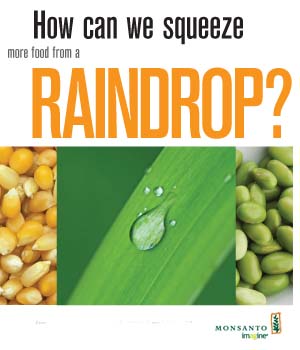 Editor’s note: Several weeks ago, the National Association of Wheat Growers (NAWG) issued a press release proclaiming that 75 percent of its member farmers support the rollout of genetically modified wheat seeds. According to NAWG, wheat farmers are clamoring to follow their corn and soy counterparts toward a biotech-dominated future. Todd Leake, a wheat farmer and NAWG member, has a different viewpoint.
Editor’s note: Several weeks ago, the National Association of Wheat Growers (NAWG) issued a press release proclaiming that 75 percent of its member farmers support the rollout of genetically modified wheat seeds. According to NAWG, wheat farmers are clamoring to follow their corn and soy counterparts toward a biotech-dominated future. Todd Leake, a wheat farmer and NAWG member, has a different viewpoint.
———————
Since the Nixon Administration, farmers have been told that their survival was dependent on the ability to compete in the global marketplace. Wheat producers have been particularly mindful of the need to grow a product that meets broadest possible consumer and market expectations. As a result, fifty percent of the wheat produced in this country is destined for buyers in foreign markets, and these buyers have very specific requirements for the wheat they purchase.
Over the last 50 years we have worked diligently to develop and enhance our relationship with international buyers, who are routinely surveyed to determine which specific characteristics and traits they desire. We work with agronomists and plant breeders to develop hybrids that meet our customers’ expectations; in doing so, we have developed a mature and stable market for the wheat produced by U.S. farmers.
However, this is an increasingly shifting marketplace. Our competitors in other countries have developed the capacity to grow wheat for the export market, and buyers now have the luxury of being very selective. They are now spoiled for choice.
When Monsanto first petitioned the U.S. Department of Agriculture for deregulation of their Roundup Ready wheat, we feared consumer backlash based on the loss of European and Asian markets that corn growers experienced when genetically engineered (GE) corn varieties were commercialized in 1996. Our fears were substantiated through a Canadian Wheat Board buyer survey conducted in 2003, which determined that 83% of foreign buyers would not accept genetically engineered wheat and would seek alternate sources if either the United States or Canada commercialized a GE wheat variety. Building on that survey, Dr. Robert Wisner, a respected Iowa State agricultural economist, concluded that wheat producers would see a drop of as much as 35% in farmgate prices if GE wheat were commercialized.
Nothing has changed in the global marketplace for wheat, but a recent National Association of Wheat Growers (NAWG) survey would have the world believe that wheat growers themselves overwhelmingly support adoption of genetically engineered wheat.
But this couldn’t be further from the truth. Although NAWG has publicly claimed its survey finds that “more than three-quarters of the respondents approved a petition supporting the commercialization of biotechnology in wheat,” a close examination of that petition reveals that NAWG fundamentally misrepresents its own data, overstates the significance of the results, and exaggerates U.S. wheat growers’ demand for genetically engineered wheat – all to the detriment of its member farmers.
To begin with, NAWG states that only growers with more than 500 acres of wheat and more than 1,000 acres in total production were chosen to participate (to save on postage, NAWG claims); only 32% of them took part in the postcard solicitation survey. Every year I grow substantially more than 500 acres of wheat, and yet, I never received a survey. Why were particular farmers chosen and why were other growers left out?
The survey itself made virtually no effort to glean nuanced truth from its participants. Respondents were not asked whether or not they would grow GE wheat, only to endorse a petition that “encourages both public and private sectors to support the discovery and development of new technologies” for wheat. Biotechnology was merely one of many potential methods mentioned within the much broader context of NAWG’s stated desire to increase the productivity, profitability, and sustainability of the wheat growing industry, three things no sane wheat grower would disagree with.
Of the 21,262 survey cards sent out, 5,272 marked their checked the “I AGREE!’ biotech wheat/petition box. NAWG somehow interprets this as 76% of growers endorsing biotech wheat. NAWG apparently didn’t want to mention the 1, 635 wheat farmers who checked the I DISAGREE box and chose to ignore the 14,355 producers who likely tossed it aside with the rest of the junk mail.
I first became aware of this NAWG survey at a speech by NAWG CEO Daren Coppeck given at a breakout session of the Minnesota Association of Wheat Growers (MAWG) annual meeting in Grand Forks, North Dakota in Dec. 2008. In his speech Mr. Coppeck said “There will be biotech wheat.” He went further to say that enforcement actions against farmers would be necessary to protect biotech companies’ investment. Does it surprise me that Mr. Coppeck would be able to predict the outcome of a survey that had yet to be mailed out or he would advocate suing farmers that save their own wheat seed? Not really, because after years of attending such annual meetings and MAWG functions such as the annual wheat summits, I have witnessed the leadership of MAWG endorse GE wheat even when a poll of the membership attending did not. I have seen the leadership of MAWG endorse GE wheat even when there was no particular GE wheat trait that they were endorsing. In other words: GE wheat for the sake of GE wheat.
It is clear to farmers and close observers that improving productivity, profitability, and sustainability does not depend upon the introduction of genetically engineered wheat. In fact, the greatest strides in developing modern, superior wheat varieties have been made through traditional breeding methods, not genetic engineering. Introduction of GE wheat will cause wheat seed to become proprietary property of seed companies, increase seed costs for farmers and keep wheat producers under the thumb of 5 international seed companies.
NAWG’s claim of overwhelming demand is misleading at best, and does not represent the position of the farmers for which NAWG claims to speak. Even if NAWG’s survey had not been fudged, U.S. wheat growers know that there is zero market demand. We know our buyers, and they will simply not accept genetically engineered wheat. They have told us so to our face, politely and repeatedly.
The purpose of the National Association of Wheat Growers (NAWG) is to promote our industry and to develop our markets, and it is funded with wheat grower dollars. To conduct and publish a survey that blatantly misrepresents the opinions of the very constituency it was created to serve is unconscionable. The commercialization of GE wheat will have one consequence only: the destruction of a stable, mature wheat producing industry that has taken 50 years to build.



